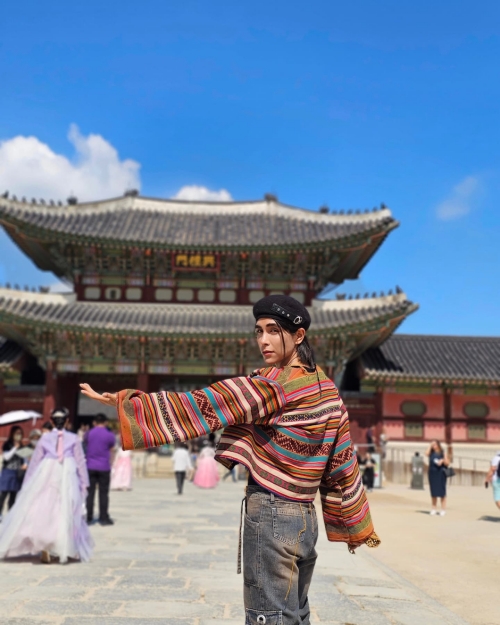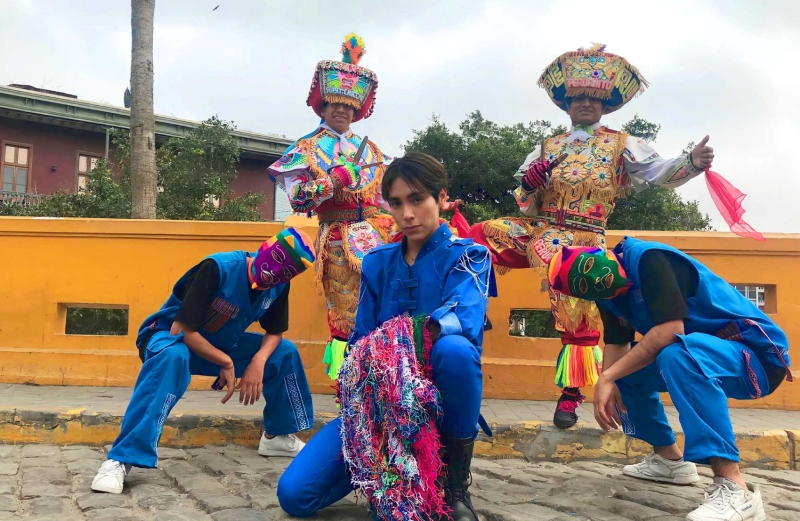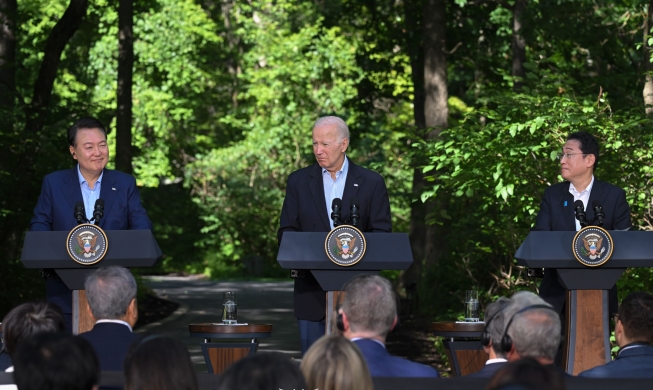By Kim Hyelin
Photos = Tamayo's Instagram account
Video = YouTube channel "Arirang K-pop"
On Oct. 3 at 7:30 p.m., a concert hall in the basement of the Peruvian Embassy in Seoul's Jung-gu District began to bustle with music. A young man in a colorful outfit appeared on stage, after which rhythmic beats and the powerful moves of backup dancers filled the stage.
It sounded like K-pop at first glance, but the singer was belting out lyrics neither in Korean nor English but in Quechua, a language in Peru used by an indigenous tribe in the Andes Mountains. This one-of-a-kind harmony was unfamiliar but new and fresh and marked the debut of Q-pop in Seoul.
Lenin Tamayo arrived in Korea after flying over 24 hours. Raised in a Quechua-speaking family, he learned traditional Andean music from his musician mother. After being introduced to K-pop, Tamayo created a new musical genre by combining Quechua and K-pop to invent Q-pop.
His innovative music instantly won him fans around the world, attracting millions of views on short-form platforms and making him an overnight star. He was also invited to perform at cultural events hosted by a Korean diplomatic mission or Korean Cultural Center abroad.
Tamayo's music has earned him far more than just glamorous moments on stage. Earlier this year, the U.S. pop culture magazine Rolling Stone ranked him among "19 Latin Artists We're Rooting for in 2024," while Time magazine hailed his creativity by including him on its list of "Fall 2024 Class of Next Generation Leaders."
The first leg of his concerts in Korea started on a stage in Seoul's Jongno-gu District, followed by events like the Andong Maskdance Festival in Andong, Gyeongsangbuk-do Province, and Seoul Plaza, showcasing the power of music without borders.

Q-pop creator and singer-songwriter Lenin Tamayo visited Korea in early October this year. He is shown posing for photos in front of Gyeongbokgung Palace in Seoul.
Korea.net interviewed Tamayo after his first concert in the country. He impressed the audience by teaching a few Quechua lyrics in acoustic form before beginning his performance.
"In Peru, I also try to connect with the audience by combining acoustic play and performance," he said. "The power of music is the ability to deeply connect with just a few words even if you don't speak the language fluently."
On his impression after completing his first concert in the country, he expressed how touched he was, saying, "I saw amazing energy in Korean culture."
So why the fascination with K-pop? Tamayo described the loneliness he felt after moving from the Peruvian capital of Lima to a provincial city and then back to Lima during middle school.
Feeling isolated in his new environment, he said friends who loved K-pop approached him and led him to the world of the genre, something that offered him comfort. "After learning more about K-pop, my desire to help my mother's artistic activities with music grew," he said.
Turning to K-pop's influence on Q-pop, he said, "K-pop is attractive in how it combines dance, music and performance on one stage. Its ability to deliver diverse feelings and messages in a short time is a big inspiration."
He added that his music fully reflects the influence of Andean culture from his mother.

Q-pop pioneer Lenin Tamayo (center) on Oct. 4 poses with dancers wearing traditional Peruvian costumes and masks before performing at the Andong Maskdance Festival in Andong, Gyeongsangbuk-do Province.
Tamayo cited openness and freedom as the emotions he felt while working on Korean and Peruvian music, saying, "I could feel such openness and honesty from the traditional music of both cultures."
"During my visit to Korea, I was moved by the passion and dedication to perfection I saw in the dancers I practiced with," he said, expressing hope for collaboration with Korean artists. "I have no specific plans yet but I do have many artists whom I wish to work with."
On his musical beliefs, Tamayo answered with the words "Amor y libertad" (love and freedom). He said he often introduces himself with both terms, something he did when meeting Korea.net.
When both concepts are combined, he added, peace and hope will come. This belief is also linked to his favorite Quechua word "phaway," which means "to fly" and "to run fast." He said this term expresses the feeling of flying when running fast.
As the interview ended, Tamayo said, "Fly without fear."
"Take on any challenge and experience. Failure is also part of life, but what matters is the strength to keep going until the end," he added, stressing the importance of not giving up and walking one's own path.
kimhyelin211@korea.kr

